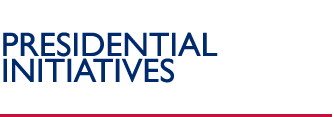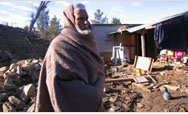 |
Status of Presidential Initiatives FY 2004
The National Security Strategy of the United States of America places international development in line with defense and diplomacy as the third pillar of U.S. national security. In recognition of this significant responsibility, President George W. Bush has announced several international development initiatives that are implemented, in whole or in part, by USAID.
Of the 19 initiatives announced since 2001, results from 12 were consolidated by USAID to produce a status report at the end of FY 2003. For FY 2004, 13 presidential initiatives reported results to a consolidated reporting system managed by USAID, five tracked and reported their results using other monitoring systems, and one was in the startup phase and has no data to report.
USAID's consolidated reporting system, launched in March 2003, collects qualitative and quantitative program and budget data twice a year to highlight achievements as well as identify potential problems. The presidential initiative report for FY 2004
- presents a snapshot of all 19 initiatives;
- includes a table showing the countries where 10 of the 13 reporting initiatives work (three initiatives-Faith-Based and Community Initiatives, the Global Fund to Fight AIDS, Tuberculosis, and Malaria, and Volunteers for Prosperity-operate globally); and
- expands on the FY 2003 status report by including a "Success Story" and "Lessons Learned" section for each initiative.
Funding
Obligations in FY 2004 for the 11 initiatives that receive program funds and report to USAID totaled $1,727,328,000 (includes $44,323,000 appropriated in FY 2003 and $1,683,005,000 appropriated in FY 2004). Two initiatives, Faith-Based and Community Initiatives and Volunteers for Prosperity, report to USAID but do not receive program funds.
Results
Each initiative achieved many programmatic successes in FY 2004. This site presents only selected achievements, including the following from the 13 initiatives reporting to USAID:
- The Kabul-Kandahar highway has been open to traffic since late 2003. As a result of the Afghanistan Road Initiative, travel between Kabul and Kandahar now takes 5-6 hours-a year ago, it took 9-16 hours depending on the mode of transportation. People living near the highway enjoy better access to markets, healthcare, schools, and jobs. At the national level, the highway has already begun to contribute to Afghanistan's economic growth, security, and national unity.
- Under the Africa Education Initiative, over 925,000 African primary school children have improved learning environments.
- Under the Centers for Excellence in Teacher Training initiative, nearly 5,000 teachers have been trained in effective reading instruction methodologies, helping over 225,000 children in Latin America and the Caribbean learn to read and, more importantly, understand what they read.
- Under the Central American Free Trade Agreement initiative, nearly 48,000 farmers, microentrepreneurs, and small and medium-sized businesses received training that helped make their products and services more competitive in local, regional, and global markets.
- Under a Clean Energy Initiative program targeted at reducing energy use in municipal water systems, a Brazilian utility saved enough to connect 85,000 new customers to water and sanitation services; Mogale City, South Africa, realized an annual cost savings of $800,000; and the water system in Veracruz, Mexico, saw a 22 percent energy efficiency improvement due to improved pressure management and reduced water loss.
- Central African Regional Program for the Environment/Congo Basin Forest Partnership partners working in Equatorial Guinea and the Democratic Republic of the Congo are helping local organizations develop programs to ensure that the next generation of African conservationists has access to high-quality academic and technical information to reduce dependence on external sources of technical expertise.
- The Digital Freedom Initiative (DFI) reports that in Indonesia, through increased awareness, small and medium-sized enterprises now understand the need for cybersecurity. In addition, the Government of Indonesia is drafting improved legislation and is considering ratification of the Convention on Cyber-crime. DFI/Senegal identified and developed a variety of ICT-enabled training materials, which have been used to help improve cybercafe operations, business management, and market access for dozens of Senegalese small and medium-sized enterprises. DFI/Senegal is now working to leverage its investment in these materials to have them used country-wide.
- To provide technical assistance regarding opportunities at USAID, the Agency's Center for Faith-Based and Community Initiatives meets regularly with faith-based and community organizations and has developed an email list of approximately 1,200 members.
- Because of the Global Fund to Fight AIDS, Tuberculosis, and Malaria, in Morocco, 3,400 people are receiving HIV voluntary counseling and testing, and 583 men and women are receiving antiretroviral therapy (ART).
- Under the Initiative to End Hunger in Africa, 157 public and private partnerships have been formed, facilitating improved access to knowledge, markets, and better technologies for member organizations, as well as improved consultation needed to strengthen strategic planning and management.
- Under the Trade for African Development and Enterprise initiative, the East and Central Africa Global Trade Competitiveness Hub (based in Nairobi, Kenya) organized three trade missions to the United States for handicrafts and gifts and textile and apparel manufacturers. Twenty-three companies from the region participated, resulting in exports of $3.5 million to the United States.
- USAID's Volunteers for Prosperity Office recruited nearly 200 nonprofit and for-profit organizations, representing a pool of at least 34,000 skilled U.S. professionals. These organizations report that nearly 7,000 volunteers have been deployed, and that nearly 4,000 volunteer opportunities are currently available.
- Under the Water for the Poor Initiative, over 9,585,000 people in developing countries, in addition to more than 1,759,000 in Iraq, have received improved access to clean water supply. Over 11,441,000 people, in addition to more than 9,613,000 in Iraq, have received improved access to adequate sanitation since the onset of the initiative.
Back to Top ^
|


